We Slow Tech: The exploration of low-tech solutions across Europe by our two students Théobald and Antoine
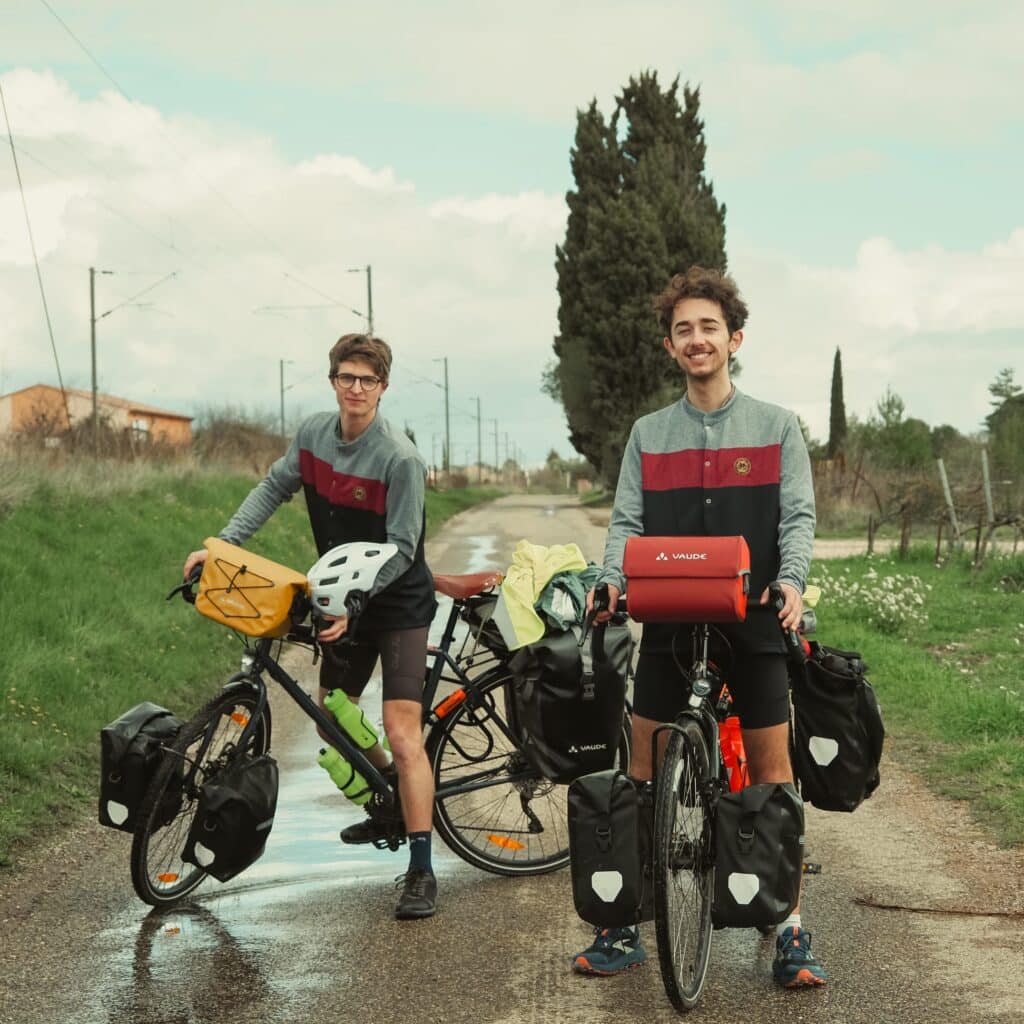

Their objective? To meet European low-tech players in order to better understand this innovative approach and explore how it could be more widely adopted in tomorrow’s world. This adventure is at once human, scientific and sporting, as Antoine and Théobald travel by bike, and will be the subject of a documentary that will enable them to share their thoughts while giving a voice to the players they meet.
After two months on the road, they present their recent low-tech discoveries and the striking encounters they have made, inviting us to reflect on innovative and sustainable alternatives for the ecological transition.
We decided to go and meet the people who are concretely taking part on a daily basis in the invention of a new narrative: those involved in the low-tech approach. This innovative approach, which is making its way into engineering schools, appeals to us and fits in with our convictions. So it’s decided: low-tech will be our angle!
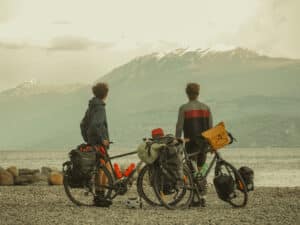
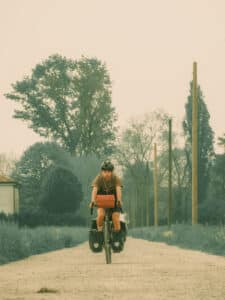
How did you come up with the idea for this project?
In November 2023, we first raised the idea of “seeing cool things for the environmental transition” for our second part of our gap year. It was still a bit hazy in our heads, but we wanted to build a personal project: traveling around Europe and getting inspired by the encounters and initiatives we’d see along the way.
We put a lot of thought into it, and decided to go and meet the people who are concretely involved on a daily basis in the invention of a new narrative: those involved in the low-tech approach!
The low-tech approach advocates a measured use of technological elements (techno-discernment), to reduce environmental impacts as much as possible and meet development challenges in a more sustainable and equitable way. The idea is to question and evaluate real human needs – not an easy question! -and then develop simple, appropriate and sustainable practices to meet the needs identified.
This approach to innovation, which is making its way into engineering schools, appeals to us and is in line with our convictions. So we’ve decided to focus on low-tech.
How did you go from idea to reality?
From November to February, we set about understanding what we each personally wanted from the project, defining its contours, finding a name for it (We Slow Tech), convincing the school to let us go, finding funding for the next 5 months of exploration, and contacting the players we would be meeting. So we’ve only got 3 months left to prepare for our journey, while we’re both on placement. But we’re excited by the idea of creating this project that will be like us, and we’re giving it our all for these 3 months! Feedback from former students who have also done bike tours for various reasons has helped us a lot during this period of preparation. They made us want to go on the adventure even more!
It was at this point, discussing their various projects with others, that we decided not to make We Slow Tech just a personal project. We want to share it, and hopefully inspire others to travel more slowly, commit to environmental transition and explore the concept of low-tech! So we added 4 kilos of audiovisual equipment to our saddlebags…
On March 3, we’re in Lyon, the last goodbyes are said and the bikes are loaded. It’s departure day. It’s snowing.
On March 4, we’re still in Lyon, but the weather’s fine! That’s it, we’re off.
As we set off, we realize that we haven’t had time to: practice riding our bikes, decide on our route and learn how to use the camera. We’ll see about that on the way 🙂
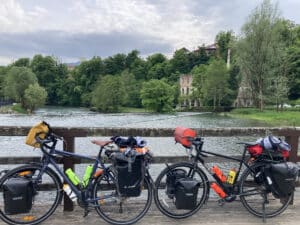
Did you meet many new people?
Finding players and projects is very time-consuming, but in the end it’s always a pleasure to meet committed people. In the face of the eco-anxiety that some of us can sometimes suffer, going out to meet concrete initiatives to meet the challenges of transition is a real remedy!
Our first stop is Marseilles, home to Le Présage, Europe’s first restaurant to use concentrated solar power for cooking. Convinced of the relevance of this initiative, we have dedicated the first episode of our mini-series “⚙️ We Slow 🚴” to solar catering:
We then headed to Sophia Antipolis, to take part in the first days of the Mines Paris – PSL “UnderSolar” engineering term, which aims to melt glass using a low-tech solar furnace.
Along the way, we met many people. With Karine, for example, who has self-built her bakery with local materials, or Loïc, who founded the Permabita association with the aim of recreating local eco-materials chains in the Var department.
After two weeks in France, we cross the border into Italy. We wondered whether we’d be able to meet so many people, and whether language would be a barrier. These fears soon proved unfounded: the Italian grandparents are just as welcoming as in France, they cook excellent pasta, and we manage to speak a little Italian!
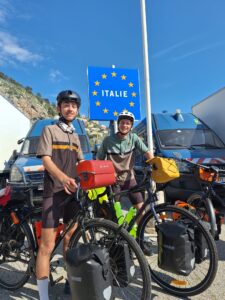

On the low-tech side, in Genoa we meet researchers in nature-based solutions who are assessing the impact of green facades, before stopping off for a week in Granara, an eco-village in the Northern Apennines.
There, they are experimenting with “appropriate” techniques (and yes, outside France, the term low-tech speaks much less to the players we meet), such as a natural swimming pool or earth-straw or lime-hip renovation:
In Milan and Padua, we discuss the circular economy with researchers and business leaders, and in Mestre, we meet Milo, who has set up his own bike-based logistics company for last-mile deliveries – a no-brainer, in his view. To make all these meetings, word of mouth works enormously! Once we’d made an initial acquaintance, it was off to a flying start: there’s always someone who knows someone who’s working on subjects close to our own. So we quickly established a golden rule during our trip: always say yes! Sometimes it’s a bit tiring, but it allows us to meet new people and experience unforgettable, and above all… unexpected moments. And that takes us completely out of our daily lives, where everything is organized.
We enjoyed Italy so much that we stayed for a month, but at some point we just had to keep going… towards Slovenia.
As much as we understood and spoke a little Italian, Slovenian was much less obvious. So, to ask if we could pitch our tent in the gardens of people we met, we used sign language. This visit to Slovenia will be another opportunity to meet a variety of initiatives. We have an appointment with two object libraries, one in Idrija and one in Ljubljana. On the way between the two towns, we stop off at a waste disposal center that tries to reuse as much waste as possible before throwing it away, by repairing or giving a second life to certain materials, resulting in objects that they sell in their own store.
We’ve already met some fifteen transition players, each with different projects, more or less close to the low-tech approach. Although the diversity of the initiatives we’ve discovered makes the task of synthesizing them – which will culminate in the documentary – more difficult, it accentuates our feeling of being galvanized by this abundance of ideas: very often we’re surprised by the ingenuity of the approach and want to carry out a similar project! We hope we’ll be able to capture the inspiring aspect of these encounters.
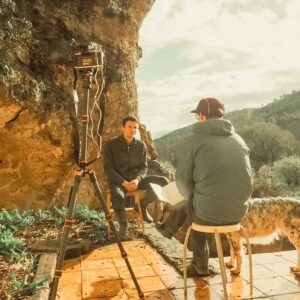
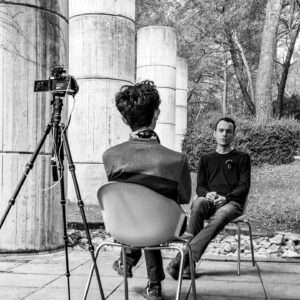
(Interviews with transition players for the documentary.)
And after 2 months on the road?
We’ve been on the road for 2 months now. Compared to the car, train or plane, we’re not going very fast. But this is the right speed for us. The encounters, whether planned or not, are numerous and always rich in emotion.
We’re currently on the road between Ljubljana and Zagreb. There, there’s a Repair Café that we’ve contacted. After that, we don’t know yet. We want to go to Bosnia-Herzegovina and Montenegro. Or Serbia, perhaps. What is certain is that we’ll be in Budapest at the beginning of June to meet Cargonomia, a cooperative of three companies promoting sustainable food and logistics by bike, before heading back to France, via Austria, the Czech Republic, Germany and Switzerland.
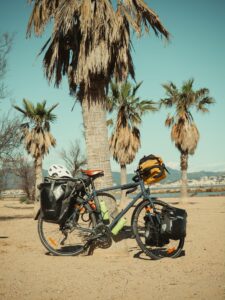
We often think back to the decision we took last November, and how lucky we were to find people who saw our project as an interesting initiative. Without these structures, which are now We Slow Tech partners, this adventure would have been more difficult to prepare in the time available, so we’d like to thank them: our “academic” partners: the Fondation de Mines Paris and PSL University; our “transitions” partners: the consultancy firm Stim, the Singular Planet foundation and the NGO International Impact; and our “adventure” partners: Chef de file for the cycling clothes and Orium for the portable battery.
The first few weeks of the trip were an opportunity for us to make an observation that the following weeks would only reaffirm: strangers are almost always ready to welcome us, to open their homes to us, to share a meal, and the curiosity of one another regularly leads to encounters that we won’t forget. We knew that setting off by bike would lead to encounters, but we had no idea that they would touch us so deeply.
In the end, we found what we were looking for: inspiring projects and wonderful encounters. We hope to continue on this path… To be continued!
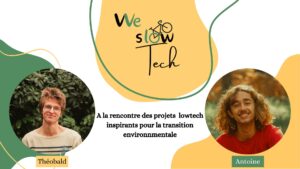
Throughout their journey, which will end in July, Antoine and Théobald will share their adventures and discoveries on social networks:
To report on their journey, they document it in a blog that traces their itinerary:
![[LOW-TECH] UNDERSOLAR engineering project: a solar furnace for the Biot glassworks](https://www.minesparis.psl.eu/wp-content/uploads/2024/05/IMG_5843-scaled.jpg)
Mines Paris – PSL trains tomorrow’s engineers in sustainable practices, notably through the design of concentrated solar furnaces, in collaboration wi...